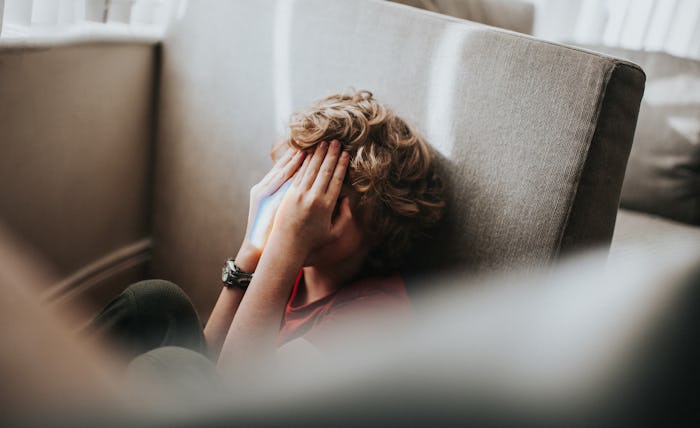Life

Kids May Feel Guilty If Someone They Know Contracts COVID — Here's How To Help
A child's emotions on any given day can run the gamut from elation to despair and back again. This is especially true right now as the world around them is filled with a myriad of uncertainties. Teaching kids not to feel guilty if people they know get sick may not have been on your back-to-school checklist last year, but thanks to the novel coronavirus, everything is different now.
"As parents around the country navigate the return to school or hybrids of onsite and remote learning with their kids, we need to be aware of the possibility of someone at our child’s learning facility getting sick," neuropsychologist Dr. Sanam Hafeez, Psy.D., tells Romper. "Parents should have an action plan to help their child understand the circumstances and help them get through any fear, stress, or guilt they may feel if and when a teacher, a friend, or a loved one gets sick."
If it hasn't already happened, the likelihood that your child will know someone who gets sick may be higher than usual with schools and day cares reopening. Back in a school setting, kids will come into contact with more people on a regular basis, which increases the odds that someone they're now around — their teacher, principal, or even a classmate — will contract COVID-19. Having a plan for how to help them through this is key.
"With the uncertainty of COVID-19, it is normal for children to feel a sense of guilt if someone they know gets sick. It is important for parents to validate their child’s feelings and provide honest, age-appropriate answers in order to correct any misconceptions," Kelly Beck, certified child life specialist (CCLS) with Sinai Hospital of Baltimore, tells Romper.
Dr. Laura Gray, Ph.D., clinical psychologist at Children’s National Hospital, recommends that parents remind their child of all of the precautions they have taken to help keep people safe — washing hands, wearing masks, social distancing — and reassure them that someone getting sick around them is not their fault. "We may not know exactly how they caught the virus, but we do know that you did not want anything bad to happen to them," she says parents can tell their children. "We know that you have worked hard to help keep others safe. You are doing the best things that we know, and you can help keep others healthy by continuing these strategies."
Even if your child feels guilty about someone around them becoming sick during the pandemic, Hafeez explains that it can be an opportunity to highlight another important life lesson: "You can only control your actions."
"As long as we are doing everything we can to keep safe and to keep others safe, we have to accept that the rest is out of our hands," Hafeez says.
In addition to talking through their emotions and remaining present with your kids, Beck recommends parents help their children practice several physical ways to help relieve the stress these feelings of guilt could cause. "Oftentimes, children feel out of control with increased stress and anxiety," she explains. "Parents can implement several strategies to help reduce stress like breathing and mindfulness exercises, listening to music, tactile art activities, exercise, and more."
Even in a post-coronavirus world, these are skills that you won't be sorry for teaching your kids at an early age. If a family member gets diagnosed with a severe illness like cancer or Alzheimers, your kids will already have the tools in their toolbox for how to handle the emotions that come along with such a diagnosis and practice empathy.
"Seeing empathy in practice is the best way for children to learn about it. If someone you know becomes sick, it’s important to voice your concern for them so that children hear that concern," Dr. Drew A. Pate, M.D., chief of psychiatry at LifeBridge Health, tells Romper. "Then children can think about ways to help those who are sick. As parents and caregivers, it’s important to remind our children that we can’t make judgments about how others became sick, but instead express our concern for them and do as much as we can to help them get better while also following all the rules to keep ourselves and our other loved ones safe."
Experts:
Kelly Beck, CCLS, Sinai Hospital of Baltimore
Dr. Laura Gray, Ph.D., clinical psychologist at Children’s National Hospital
Dr. Sanam Hafeez, Psy.D., a neuropsychologist in New York City, faculty member at Columbia University
Dr. Drew A. Pate, M.D., chief of psychiatry, LifeBridge Health in Maryland